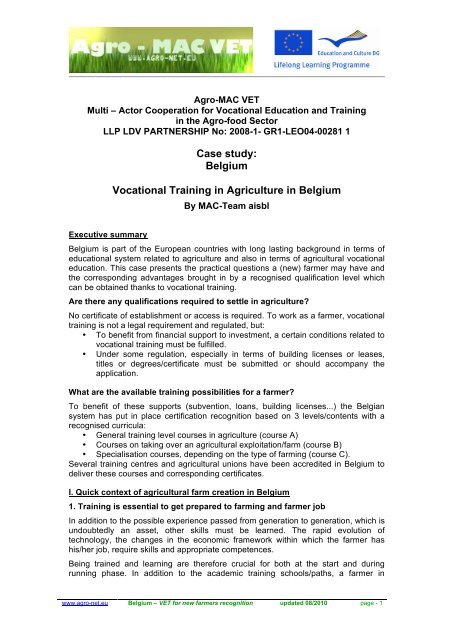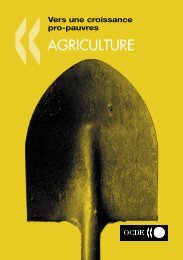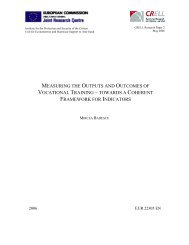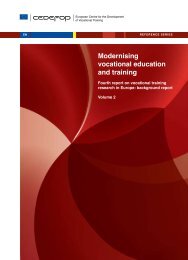AMV_cs_belgium-vet-farmer-full-v03.pdf - the Agro-MAC VET
AMV_cs_belgium-vet-farmer-full-v03.pdf - the Agro-MAC VET
AMV_cs_belgium-vet-farmer-full-v03.pdf - the Agro-MAC VET
You also want an ePaper? Increase the reach of your titles
YUMPU automatically turns print PDFs into web optimized ePapers that Google loves.
<strong>Agro</strong>-<strong>MAC</strong> <strong>VET</strong><br />
Multi – Actor Cooperation for Vocational Education and Training<br />
in <strong>the</strong> <strong>Agro</strong>-food Sector<br />
LLP LDV PARTNERSHIP No: 2008-1- GR1-LEO04-00281 1<br />
Case study:<br />
Belgium<br />
Vocational Training in Agriculture in Belgium<br />
By <strong>MAC</strong>-Team aisbl<br />
Executive summary<br />
Belgium is part of <strong>the</strong> European countries with long lasting background in terms of<br />
educational system related to agriculture and also in terms of agricultural vocational<br />
education. This case presents <strong>the</strong> practical questions a (new) <strong>farmer</strong> may have and<br />
<strong>the</strong> corresponding advantages brought in by a recognised qualification level which<br />
can be obtained thanks to vocational training.<br />
Are <strong>the</strong>re any qualifications required to settle in agriculture<br />
No certificate of establishment or access is required. To work as a <strong>farmer</strong>, vocational<br />
training is not a legal requirement and regulated, but:<br />
• To benefit from financial support to investment, a certain conditions related to<br />
vocational training must be fulfilled.<br />
• Under some regulation, especially in terms of building licenses or leases,<br />
titles or degrees/certificate must be submitted or should accompany <strong>the</strong><br />
application.<br />
What are <strong>the</strong> available training possibilities for a <strong>farmer</strong><br />
To benefit of <strong>the</strong>se supports (subvention, loans, building licenses...) <strong>the</strong> Belgian<br />
system has put in place certification recognition based on 3 levels/contents with a<br />
recognised curricula:<br />
• General training level courses in agriculture (course A)<br />
• Courses on taking over an agricultural exploitation/farm (course B)<br />
• Specialisation courses, depending on <strong>the</strong> type of farming (course C).<br />
Several training centres and agricultural unions have been accredited in Belgium to<br />
deliver <strong>the</strong>se courses and corresponding certificates.<br />
I. Quick context of agricultural farm creation in Belgium<br />
1. Training is essential to get prepared to farming and <strong>farmer</strong> job<br />
In addition to <strong>the</strong> possible experience passed from generation to generation, which is<br />
undoubtedly an asset, o<strong>the</strong>r skills must be learned. The rapid evolution of<br />
technology, <strong>the</strong> changes in <strong>the</strong> economic framework within which <strong>the</strong> <strong>farmer</strong> has<br />
his/her job, require skills and appropriate competences.<br />
Being trained and learning are <strong>the</strong>refore crucial for both at <strong>the</strong> start and during<br />
running phase. In addition to <strong>the</strong> academic training schools/paths, a <strong>farmer</strong> in<br />
www.agro-net.eu Belgium – <strong>VET</strong> for new <strong>farmer</strong>s recognition updated 08/2010 page - 1
Belgium can:<br />
• Freely attend a series of fur<strong>the</strong>r training organized by some vocational<br />
training centres<br />
• Participate in various information days and study sessions organized by<br />
various actors of <strong>the</strong> agricultural sector<br />
• Get involved in management group approaches (via rural unions for<br />
instance).<br />
2. Types of new agricultural activity creation<br />
A <strong>farmer</strong> can also make a placement within an existing agricultural exploitation<br />
(farm...) in order to get introduced to or to develop his/her experience in one or more<br />
specific areas.<br />
A new <strong>farmer</strong> generally has two ways to start his/her business:<br />
• as <strong>farmer</strong> "natural person" in this case, <strong>the</strong>re will be no clear separation<br />
between <strong>the</strong> professional and private assets.<br />
• as managing director (or manager) of a company (legal entity). The libretto<br />
of Agriculture published by <strong>the</strong> DGA with references here: "Chr. Le Borne,<br />
Les Sociétés en agriculture, Namur, 2006" encloses a detailed description to<br />
understand <strong>the</strong> different types of companies.<br />
In terms of social status, <strong>the</strong> facility as a farm "natural person" or "managing director"<br />
(or manager) is proved by its membership in a social insurance fund as an<br />
independent in principal or accessory.<br />
Whatever <strong>the</strong> legal form chosen, two scenarios are possible to settle in agriculture:<br />
<strong>the</strong> taking-over or <strong>the</strong> creation of a farm:<br />
• ei<strong>the</strong>r <strong>the</strong> <strong>farmer</strong> takes over an existing agricultural exploitation, belonging to<br />
an active <strong>farmer</strong>, family member or not.<br />
Depending on <strong>the</strong> shares taken over, we can distinguish two cases:<br />
• Total take over: <strong>the</strong> <strong>farmer</strong> takes ownership of all property of a farm<br />
• Un-divided partial recovery (association): <strong>the</strong> <strong>farmer</strong> takes over only part<br />
of <strong>the</strong> movable property of an existing operation, which remains in activity,<br />
and it creates an association.<br />
• ei<strong>the</strong>r <strong>the</strong> <strong>farmer</strong> creates a new agricultural exploitation.<br />
We can also distinguish two cases:<br />
• partial take over divided (split): <strong>the</strong> <strong>farmer</strong> takes up only part of <strong>the</strong><br />
movable property of an existing operation and it creates with this part<br />
taken, a new operation<br />
• creation on a production site that did not exist<br />
3. When does a capacity level recognition become a requirement in agriculture<br />
in Belgium<br />
At farm level, considering administrative matters <strong>the</strong> creation of an agricultural<br />
exploitation means:<br />
• Assignment of a new business number (VAT number activated) and<br />
• Assignment of a new producer number (Technical id card of <strong>the</strong> farm - Carte<br />
Technique d'Identification CTI).<br />
However this is not a legal requirement. It is only required if <strong>the</strong> <strong>farmer</strong> wishes to be<br />
eligible to obtain compensatory payments/subventions or is subject to <strong>the</strong> system of<br />
milk quotas.<br />
To benefit from financial support to investment, a certain conditions related to<br />
vocational training must be fulfilled. (FIA: minimum capacity of first installation).<br />
Under some regulation, especially in terms of building licenses or leases, titles or<br />
degrees/certificate must be submitted or should accompany <strong>the</strong> application.<br />
www.agro-net.eu Belgium – <strong>VET</strong> for new <strong>farmer</strong>s recognition updated 08/2010 page - 2
II. Vocational training possibilities for a <strong>farmer</strong> starting a new activity<br />
In complement to securing smooth and successful development of a new farm<br />
project, vocational training under recognised curricula by <strong>the</strong> Belgian government<br />
enables <strong>farmer</strong>s to benefit of support schemes (subvention, loans, building<br />
licenses...).<br />
The Belgian vocational training system in agriculture proposes certification<br />
recognition based on 3 levels/contents with recognised curricula:<br />
• General training level courses in agriculture (course A)<br />
• Courses on taking over an agricultural exploitation/farm (course B)<br />
• Specialisation courses, depending on <strong>the</strong> type of farming (course C).<br />
Several training centres and agricultural unions have been accredited in Belgium to<br />
deliver <strong>the</strong>se courses and corresponding certificates.<br />
The curricula are similar in <strong>the</strong> Belgian federal states but present a few differences<br />
especially in terms of duration (Courses C are defined on an ad-hoc basis):<br />
Federal regions Course A Course B Comments<br />
Flemish region • Minimum 75<br />
hours, (basic<br />
knowledge of<br />
general and<br />
specific<br />
agricultural law,<br />
economi<strong>cs</strong> and<br />
business<br />
accounting).<br />
Walloon region<br />
and<br />
German<br />
Community<br />
• Minimum 75<br />
hours<br />
• + additional<br />
technical<br />
teaching<br />
requested by <strong>the</strong><br />
project<br />
1. Course A, general agriculture<br />
• At least 40<br />
additional<br />
teaching hours<br />
• Attuned to <strong>the</strong><br />
agricultural<br />
sector of <strong>the</strong><br />
applicant <strong>farmer</strong>.<br />
• Economi<strong>cs</strong>, laws<br />
and business<br />
management<br />
(90h)<br />
• Minimum of 2<br />
years<br />
experiences is<br />
required<br />
• 3 months<br />
practical period<br />
in a farm.<br />
• Minimum of 2<br />
years experience<br />
• If 3 years<br />
experiences:<br />
only course B is<br />
required<br />
These courses on agricultural techniques are delivered in <strong>the</strong> evening or during <strong>the</strong><br />
day, usually between November and May. These courses are intended to update <strong>the</strong><br />
knowledge base in agriculture to potential new farm managers (or willing to re-train).<br />
Different subjects are addressed, such as crops, fertilization, mechanization, crop<br />
protection, animal husbandry, livestock feed, livestock diseases, geneti<strong>cs</strong> and<br />
breeding, milk production, rural economy and many o<strong>the</strong>r matters<br />
2. Course B, farm take-over/creation<br />
These courses are designed to address <strong>the</strong> practical side of farming. The accounting<br />
and management aspects are crucial here.<br />
The aim of <strong>the</strong>se courses is to put in <strong>the</strong> hands of <strong>farmer</strong>s, all <strong>the</strong> weapons to<br />
manage <strong>the</strong>ir operations and <strong>the</strong>reby facilitating <strong>the</strong> way towards a successful take<br />
over or creation.<br />
Besides <strong>the</strong> aspect of management, o<strong>the</strong>r key elements are addressed in this<br />
course: Legal Aspects (leases, inheritance, marriage contracts...) and tax (insurance,<br />
www.agro-net.eu Belgium – <strong>VET</strong> for new <strong>farmer</strong>s recognition updated 08/2010 page - 3
credit...), <strong>the</strong> Common Agricultural Policy, AIDA, measures Environment (MAE,<br />
Natura 2000, environmental permits, PDGA, phyto products...), prevention of<br />
accidents and stress, Sanitel regulation, explanation of services to agriculture (rural<br />
unions, regional agriculture authorities, comitia...).<br />
3. Course C, Specialisation courses<br />
The agriculture sector is constantly changing, it is important that its key actors<br />
continued to undergo training. The topi<strong>cs</strong> are many and varied: welding, masonry,<br />
carpentry, agricultural mechani<strong>cs</strong>, accounting, crop protection, animal feed, artificial<br />
insemination, computer farm, hoof care, improvement of farm buildings,<br />
diversification into small farms, development of products soils, floral art, prevention<br />
and safety, handling livestock, cheese making, renewable energies, organic farming,<br />
etc.<br />
III. Comments:<br />
This case has been chosen at country level approach as it has been effective for<br />
several years. This approach can be fur<strong>the</strong>r considered after <strong>the</strong> <strong>Agro</strong>-<strong>MAC</strong> <strong>VET</strong><br />
project when implementing <strong>the</strong> GRAM curricula.<br />
It also demonstrates how multiplying effect has been implemented at a country level<br />
to ensure wide dissemination of <strong>the</strong> curricula towards its direct beneficiaries.<br />
References and links are provided in <strong>the</strong> <strong>Agro</strong>-<strong>MAC</strong> <strong>VET</strong> database/compendium.<br />
(more info on <strong>the</strong> <strong>Agro</strong> <strong>MAC</strong>-<strong>VET</strong> project on www.agro-net.eu)<br />
This project has been funded with support<br />
from <strong>the</strong> European Commission under <strong>the</strong><br />
framework of <strong>the</strong> Leonardo da Vinci<br />
Lifelong Learning Programme.<br />
This publication reflects <strong>the</strong> views only of <strong>the</strong><br />
authors, and <strong>the</strong> Commission cannot be held<br />
responsible for any use which may be made<br />
of <strong>the</strong> information contained <strong>the</strong>rein.<br />
www.agro-net.eu Belgium – <strong>VET</strong> for new <strong>farmer</strong>s recognition updated 08/2010 page - 4








